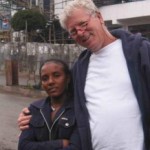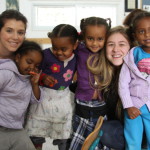 There’s no magic wand
There’s no magic wand
I am one of hundreds of Israelis of Ethiopian origin who are choosing to create intentional communities in Israel’s ‘geosocial periphery.’
When asked how I have acclimated in Israel, I usually answer with a numbers song I wrote and that was inspired by the Hadag Nahash song: 1, the number of teachers of Ethiopian origin in the schools in my community; 12, the percentage of students of Ethiopian origin in those schools; 20, the percentage of Ethiopian immigrants who leave the army within a year, although our enlistment rate is 80 percent; 30, the percentage of Ethiopian households that are single-parent families; 48 – that number reminds me of something … yes, the percentage of Israelis of Ethiopian origin under the poverty line; 50, the number of Israeli neighborhoods where 130,000 Ethiopian immigrants live.
I don’t really need all these numbers; I only have to open my window to know that something is very wrong. The government’s absorption policy was to put us in the same neighborhoods, which no one dares call ghettos, and women from Ethiopia often tell me, “God forbid my children become Israelis,” since the Israelis these women are loud, rude, jobless losers – stigma within stigma within stigma.
This knowledge, these numbers and also much of the millions being thrown in my direction do not make life easier or better for me, my children or my community.
The statistics are boring; my expectations from the state are different from the state’s expectations from me – and also, it seems, its expectations from itself – but it’s my life and I’m not waiting for a magic wand. The question is not what they give me or do for me, but what I choose to take and to do for myself. I take responsibility and join the school parents’ council, I make the effort and create after-school groups appropriate for my child, I make sure my apartment building has a board and I see to fixing up the front yard. “I” does not mean me alone, now that I know the possibilities of cooperation. It’s possible to change a neighborhood, to improve my quality of life, to open up to all the colors of Israeli society and to finally feel at home.
Sometimes it’s hard, and one must fight for what should be taken for granted. What Israeli of Ethiopian origin doesn’t know the feeling of entering a cafe and suddenly there’s silence? I must persist, to go into another cafe, to absorb this silence and not get upset. I’m a teacher, and there’s always someone who says: “Sweetie, get the mop and clean up here.” No, I am not the cleaner. I had to insist that my son not be removed from his class for extra help in Hebrew – after an evaluation that focused on the brownness of his skin.
When we, parents of Ethiopian origin, allow our children to be tracked together into lower-ability groups, we obviously affect their social development and the rest of their lives. But if I insist on eliminating these groups, I will harm the children and parents who do need help. Is a creative solution possible? Sure, by strengthening the ties between the education system and the parents, who sometimes don’t even know where their children’s schools are.
In 2005 some 30 friends, most of us immigrants from Ethiopia, sat down to think about the situation. It slowly dawned on us that none of us had stayed in the old neighborhood and that this was part of the problem. We all still had an emotional attachment to the neighborhood, and a sense of missing out: Our parents were there, some of our friends, some of our younger siblings.
We proposed a solution, which like many solutions was appropriate for some but not all of us. We proposed returning to the neighborhoods. That wasn’t obvious, returning to live in neighborhoods where the level of services is poor, to put your child into the same schools where you yourself had experienced other people’s lack of belief in people such as you. And that’s why this cannot be done alone. I chose to be part of a group that takes responsibility, that has an interesting and active communal life but also works toward change.
In recent years hundreds of Israelis of Ethiopian origin have chosen to create the longed-for change rather than waiting for it to come from outside, and are forming similar groups. When we speak of “immigrant absorption” we must consider the option of taking responsibility for our own future. We are not a unique phenomenon in Israel: Thousands of young people are choose to create communities and to move to the so-called geosocial periphery, out of awareness, a desire for change and aspiration to a better life.
Our successful absorption of Israeli society also depends on our willingness and our efforts to be universal leaders, not just for Ethiopian immigrants. Our challenge is linked to our ability to persevere in taking responsibility over time, our ability to bring the state into our way of creating change, the state’s willingness to recognize our abilities and our flexibility in adapting our solutions to the changing Israeli economy.
The writer, a new member of the Gedera town council, cofounded Friends by Nature – Community Empowerment and was awarded the Prime Minister’s Prize for Entrepreneurship and Innovation in 2011.
By Yuvi Tashome-Katz, haaretz.com













![From Being Civil Engineer in Ethiopia To Cab Driver in Washington, DC [Re-post]](https://www.ethiopianopinion.com/wp-content/uploads/2013/12/taxid-150x150.jpeg)














Join Conversations